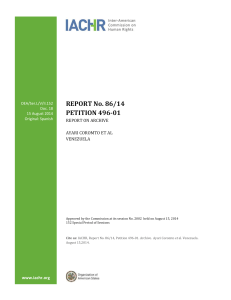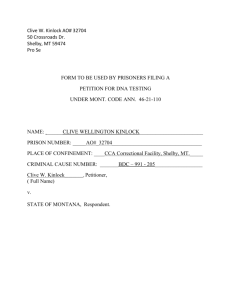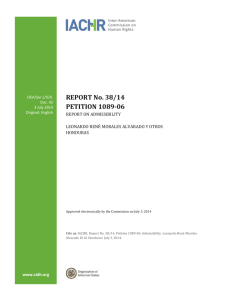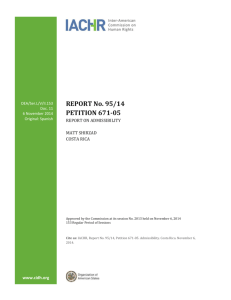Report No. 76/14 - Organization of American States
advertisement
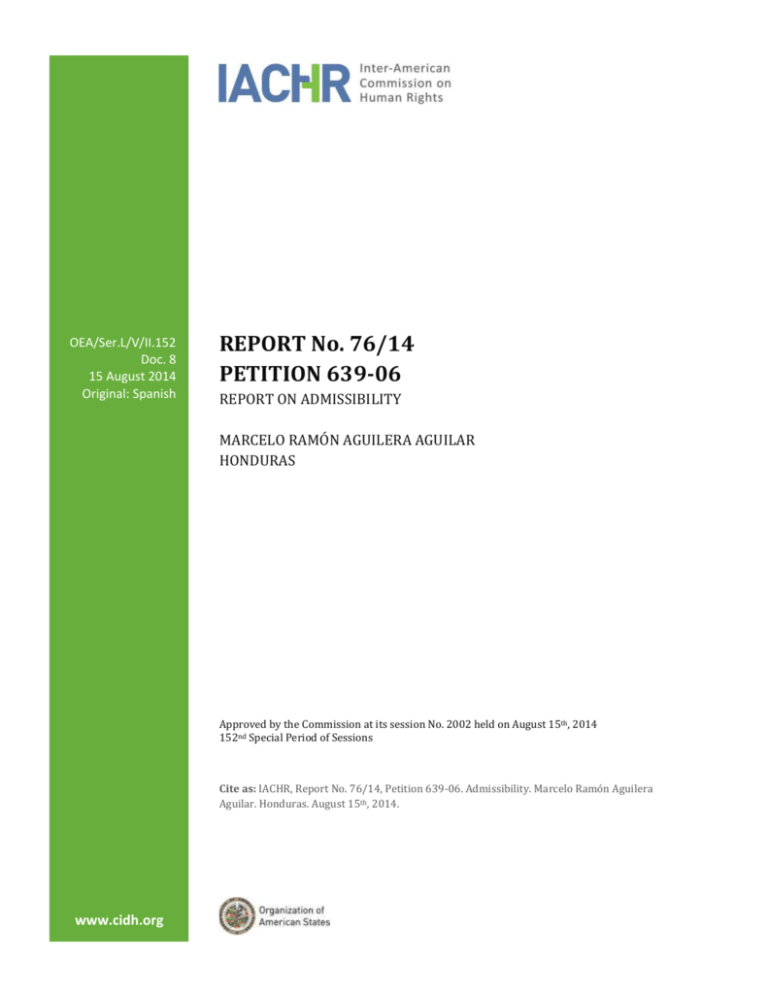
OEA/Ser.L/V/II.152 Doc. 8 15 August 2014 Original: Spanish REPORT No. 76/14 PETITION 639-06 REPORT ON ADMISSIBILITY MARCELO RAMÓN AGUILERA AGUILAR HONDURAS Approved by the Commission at its session No. 2002 held on August 15th, 2014 152nd Special Period of Sessions Cite as: IACHR, Report No. 76/14, Petition 639-06. Admissibility. Marcelo Ramón Aguilera Aguilar. Honduras. August 15th, 2014. www.cidh.org REPORT No. 76/14 PETITION 639-06 ADMISSIBILITY MARCELO RAMÓN AGUILERA AGUILAR HONDURAS AUGUST 15, 2014 I. SUMMARY 1. The Inter-American Commission on Human Rights (hereinafter "the Commission" or "the IACHR") received a petition filed by Marcelo Ramón Aguilera 1 (hereinafter "the petitioner" or 'the alleged victim"), on August 16, 2006, contending that the State of Honduras (hereinafter "Honduras," "State," or "Honduran State") bears international responsibility for alleged violations of rights protected in the American Convention on Human Rights (hereinafter "American Convention" or "Convention"), stemming from the dismissal of the alleged victim as part of a purge of National Police personnel conducted in 2001. 2. The petition alleges violation by the State of Article 8 (right to a fair trial) and Article 25 (right to judicial protection) of the American Convention, because the alleged victim had purportedly been unjustifiably dismissed on the basis of Decree 58-2001, published in the Official Gazette (La Gaceta) No. 29.504 of June 15, 2001 (hereinafter "Decree 58-2001") and because his discharge had not followed established legal procedures. The petitioner also alleges that the Honduras State is responsible for violating the rights protected under Articles 4 (right to life), 10 (right to compensation), 11 (right to privacy/ respect for honor and dignity), 17 (rights of the family), and 24 (right to equal protection) of the American Convention, in conjunction with the general obligation established in Articles 1.1 and 2 of said instrument. 3. For its part, the State indicates that the alleged victim had access to justice in keeping with Article 8 of the American Convention through the filing of the effective and appropriate appeals provided for under Honduran law, from the first instance through to appeal for annulment. It further states that the fact that the outcomes of the judicial proceedings did not favor the petitioner does not mean that he was not heard by the competent authorities. 4. Without prejudice to the merits of the case, having examined the positions of the parties and compliance with the requirements of Articles 46 and 47 of the American Convention, the Commission decided to declare the case admissible for the purposes of examination of the alleged violations of Articles 8 (fair trial/due guarantees) and 25 (judicial protection) of the Convention, in conjunction with Article 1(1) and 2 thereof. It also decided to declare the case inadmissible in respect of Articles 4 (right to life), 10 (right to compensation), 11 (right to privacy/ respect for honor and dignity), 17 (rights of the family), and 24 (right to equal protection). Finally, it decided to notify the parties of this decision and order its publication in its Annual Report to the OAS General Assembly. II. PROCESSING BY THE COMMISSION 5. The Commission took receipt of the petition on August 16, 2006 and numbered it 639-06. On April 2, 2012, the IACHR forwarded the pertinent parts of the petition to the State, requesting it to submit its response within two months, in accordance with Article 30.2 of the Commission’s Rules of Procedure. The response of the State was received on June 28, 2012, and duly relayed to the petitioner on September 3, 2012. In addition, information from the petitioner was received on October 3, 2012, March 4, 2013, and October 3, 2013. Those communications were duly forwarded to the State. For its part, Honduras presented information on March 7, 2014, which was duly forwarded to the petitioner. 1 This petition was presented by Mr. Rigoberto Duarte Acosta; however, in a note addressed to this Commission on June 26, 2012, Mr. Marcelo Ramón Aguilera Aguilar -- the petitioner and alleged victim -- announced that, as of that moment, he alone would be representing himself in his case. 1 III. POSITIONS OF THE PARTIES A. Position of the petitioner 6. This petition alleges that the State violated due process, protected under Articles 8 and 25 of the American Convention, because the alleged victim was unjustifiably dismissed on the basis of Decree 582001, which authorized the State Secretariat for Security to discharge personnel in the higher, executive, and inspector categories of the preventive, investigative, and special forces police, as well as non-commissioned officers, junior officers, and rank and file. The petition states, moreover, that at the time, the State Secretary for Security had publicly announced, based on the aforementioned decree, that [the police] were being purged because they were corrupt.” 7. The petitioner states that, since October 16, 1995, he had worked at the Technical Assistant III level in the Secretariat for Public Works, Transportation, and Housing (hereinafter “SOPTRAVI”), an institution that was also part of the Executive Branch. Later on, on July 14, 1999, he had been appointed Director General of Special Investigative Services, a dependency of the State Secretariat for Security, a position from which he was dismissed on August 9, 2001, based on Decree 58-2001, without the authorities following the procedure required by the Organic Law of the Judiciary and without his having been "heard and convicted in a trial." 8. Furthermore, the petitioner points out that in a judgment rendered on March 13, 2003, the Supreme Court of Justice of Honduras had declared Decree 58-2001 unconstitutional and inapplicable. 2 Even though Article 316.2 of the Honduran Constitution stipulates that when a law is declared unconstitutional that decision shall have general consequences and shall be applicable immediately, the Supreme Court ruled that the judgment would not have retroactive effect. 9. With respect to the exhaustion of domestic remedies, the petitioner states that, on the basis of the judgment declaring Decree 58-2001 unconstitutional, a regular complaint requesting nullification was filed with the Administrative Disputes Court (Juzgado de Letras de lo Contencioso Administrativo) to invalidate his dismissal and order his reinstatement, with payment of the wages he had not received and reparation for damages. Subsequently, the petitioner states that, when the request for nullification was denied, motions for appeal and cassation appeal (casación) of the lower court's ruling were filed, respectively, with the Court of Appeals for Administrative Disputes (Corte de Apelaciones de lo Contencioso Administrativo) and the Supreme Court of Justice. 10. Referring to the judgments they each handed down, the petitioner states that the authorities "illegally ruled against" him. First, he notes that the courts turned down his appeals on the grounds that the judgment declaring Decree 58-2001 unconstitutional was not applicable to him, because the Supreme Court of Justice had established that it would not be retroactive. That, according to the petitioner, violated his right to due process under the American Convention, given that “it clearly violat e[d] Article 316 of the [Honduran] Constitution which establishes that the unconstitutionality of a law has general consequences (efectos generales] and must be enforced immediately”. In addition, the petitioner points out that although the judgments at every instance refer to the petitioner having collected the benefits to which he was entitled, he had in fact refused to receive them because they had not recognized all the time he had worked. On this matter, the petitioner states that his time of service should have been calculated from October 1995, when he began working with SOPTRAVI, and not from the time he began working as the Director General of Special Investigative Services, in July 1999. 2 Regarding the judgments, the petitioner states that they were published by legislative decree 85-2003 of May 29, 2003 (Official Gazette No. 30166 of August 19, 2003). 2 B. Position of the State 11. The Honduran State agrees with the petitioner's statement of the position he held at the time and that he was dismissed on August 9, 2001, on the basis of Decree 58-2001. 12. As for the exhaustion of domestic remedies, the State maintains that as a result of the petitioner's dismissal as Director General of Special Investigative Services he filed a petition for nullification before the Administrative Dispute Courts and, later on motions for appeal and cassation appeal (casación). Regarding the denial of those remedies, the State points out that the judgment declaring Decree 58-2001 unconstitutional, which purportedly had led the petitioner to request nullification, has no retroactive effects and, therefore, could not be applied in favor of the alleged victim. The State adds that the exhaustion of remedies from the first instance through to cassation appeal (casación) “show[s] that Mr. Marcelo Ramón Aguilera had at his disposal every means provided for by law.” 13. In addition, the Honduran State argues that the petitioner had access to justice in keeping with Article 8 of the American Convention through the filing of "effective" and "appropriate" appeals provided for under Honduran law. It adds that the due process granted to the victim addressed his constitutional right to petition and ruled on his case in a timely manner. Accordingly, it points out that the fact that the outcomes of the judicial proceedings did not favor the petitioner does not imply that he was not heard by the competent authorities or that there was no reply to his petitions. In light of the above, according to the State, the petitioner's intention is that the Commission act as a fourth instance. 14. inadmissible. In short, the State of Honduras requests that the Commission declare this petition IV. ANALYSIS OF COMPETENCE AND ADMISSIBILITY A. Competence of the Commission ratione personae, ratione materiae, ratione temporis, and ratione loci. 15. The petitioner is entitled under Article 44 of the American Convention to lodge petitions with the Commission. The petition names as the alleged victim an individual on whose behalf the Honduran State undertook to observe and ensure the rights enshrined in the American Convention. As regards the State, the Commission notes that Honduras has been a party to the American Convention since September 8, 1977, when it deposited its instrument of ratification. Therefore, the Commission is competent ratione personae to examine the petition. The Commission is also competent ratione loci to examine the petition because it alleges violations of rights protected in the American Convention that are purported to have occurred within the territory of Honduras, a state party to said treaty. 16. The Commission is competent ratione temporis because the obligation to observe and guarantee the rights protected by the American Convention was already in force for the State at the time when the facts alleged in the petition occurred. Finally, the Commission is competent ratione materiae, given that the petition alleges possible violations of human rights protected under the American Convention. B. Admissibility requirements 1. Exhaustion of domestic remedies 17. Article 46(1)(a) of the American Convention provides that admission of petitions lodged with the Inter-American Commission in keeping with Article 44 of the Convention shall be subject to the requirement that the remedies under domestic law have been pursued and exhausted in accordance with generally recognized principles of international law. This rule is designed to allow national authorities to examine alleged violations of protected rights and, as appropriate, to resolve them before they are taken up in an international proceeding. 3 18. With respect to the exhaustion of domestic remedies, the petitioner states that he exhausted all domestic remedies through to a cassation appeal (casación). For its part, the State indicates that the petitioner wants the IACHR to constitute itself as a fourth instance because the outcomes of judicial proceedings did not favor him and did not argue the existence of other remedies that should have been exhausted. 19. In the instant case, the Commission observes that based on the judgments of March 13, 2003 that found Decree 58-2001 to be unconstitutional,3 on September 8, 2003, through the administrative litigation channel, the petitioner filed a request for nullification -- based on Decree 58-2001 -- of his dismissal from the job he had held as Director General of Special Investigative Services, a dependency of the State Secretariat for Security,4 since July 14, 1999. In that request for nullification, the petitioner also asked to be reinstated with payment of the benefits due to him as well as the wages of which he had been deprived. In his writ requesting nullification filed with Administrative Disputes Courts (Juzgado de Letras de lo Contencioso Administrativo), the petitioner stated that he had been removed from his position without just cause and without following any established proceedings for dismissal. He also requested that his severance pay take into account the fact that he had worked for the Honduran State since October 1, 1995. In a judgment handed down on July 22, 2004, the Administrative Disputes Courts (Juzgado de Letras de lo Contencioso Administrativo) declared the lawsuit filed inadmissible because the annulment of the petitioner's position "was lawful […] without prejudice to the plaintiff's right to the severance pay owed him under the decree invoked in his his dismissal, if he has not yet collected such payment." 20. According to the information provided by the Parties, the petitioner lodged an appeal against that judgment with the Court of Appeals for Administrative Disputes (Corte de Apelaciones de lo Contencioso Administrativo). That appeal was declared unfounded on October 26, 2004, based on two considerations. The first consideration was that the judgments determining the unconstitutionality of Decree 58-2001, “could not be applied in the plaintiff's favor, because, […] even though they have general consequences (efectos generales), they are not retroactive, so that only those persons who challenged their dismissals are entitled to application of those judgments to their cases," in other words, only those who filed the action for the annulment of Decree 58-2001 for violating the Constitution (accion de inconstitucionalidad) have a right to be immediately reinstated to their former position. Second, the Court of Appeals considered that the plaintiff had consented to his dismissal [because], when he was “ give[n] his severance agreement, he received it, without having challenged his termination by filing the corresponding lawsuits […] as a result of which those acts became final”. 21. Given the dismissal of his appeal, on January 5, 2005, the petitioner filed a request for nullification, arguing principally the failure to apply Article 17 of the Civil Code -- which refers to interpretation of the law --5 in connection with Article 316 (2) of the Honduran Constitution. 6 Thus, he argued that if the Court of Appeals had applied Article 17 of the Civil Code, the judgment would have been correct as regards its scope, in the sense that the effects of the decision declaring the Decree unconstitutional 3 In judgments handed down on March 13, 2003, the Constitutional Division of the Supreme Court of Justice declared Decree 58-2001 unconstitutional, in response to the following unconstitutionality lawsuits: a) Cassation appeal (casación) of a decision that allegedly violates the Constitution (recurso de inconstitucionalidad) 1665-01 (August 2, 2001), filed by Lastenia Ondina Andino Padilla, on behalf of Víctor Montoya Andino, Roberto Carlos Ortega Aguilar, Miguel Ángel Villatoro Aguilar, Alan Rinerio Nájera Martínez, Mario Antonio Álvarez Ortiz, Denis Orlando Erazo Paz, Erwin Emyl Mayes Ríos, Danis Roneth Flores Castro, Mario Francés Iscoa, and Marcos Manuel Flores Díaz, and b) Recurso de inconstitucionalidad 2424-01 (December 16, 2001), filed by Lastenia Ondina Andino Padilla, on behalf of Otto Hernández Sarmiento and Dauguil Brandal Aguilera F. See, IACHR, Report No. 57/14. Petition 775-03 (Juan González et al.), Admissibility, Honduras, July 21, 2014. 4 Through Official Letter SEDS-SG-1109-01 of July 30, 2001, it was decided to cancel Mr. Marcelo Aguilera's appointment as Director of Special Investigative Services as of August 9, 2001. 5 Article 17 of the Civil Code of Honduras establishes that "A law may not be construed to mean something other than what the terms used explicitly state, given the relation there must be between them and the legislator's intent." 6 Article 312.2 of the Constitution of Honduras states that "[...] judgments declaring a provision to be unconstitutional are to be enforced immediately and shall have general consequences (efectos generales); they shall therefore annul the unconstitutional provision [...]." 4 would also have applied to the petitioner. The file on the case indicates that on December 14, 2005, the Supreme Court of Justice declared this appeal inadmissible because “Article 17 of the Civil Code […] is a general provision, inviolable for purposes of nullification”. In addition, the petitioner requested that the Supreme Court of Justice declare the appealed judgment to be secondarily invalid because the Court of Appeals had issued its decision “in violation of Article 316.2 of the Constitution,” given that the effects of the unconstitutionality of Legislative Decree 58-2001 were not applied to him and, because of that, he had not been reinstated. The Court of Appeals declared the request for nullity inadmissible based on the same grounds as those adduced by the Court of Appeals to reject the petitioner's claim. 22. Consequently, the IACHR considers that domestic remedies were exhausted as established by Article 46.1 of the American Convention. C. Time allowed for lodging the petition 23. Article 46.1.b. of the Convention establishes that a petition may be admitted if it is lodged within a period of six months from the date on which the interested party was notified of the final judgment that exhausted domestic jurisdiction. 24. Petition 639-06 was received by the Commission on August 16, 2006. Notification of the judgment of the Supreme Court that ruled on the nullification appeal, which ended the proceedings requesting annulment of the termination of the petition's job in the State Secretariat for Security, was served on February 1, 2006, so that the six-month deadline for lodging the petition established in Article 46.1.b of the American Convention was met. D. Duplication of procedures and international res judicata 25. Article 46(1)(b) provides that the admissibility of petitions is subject to the requirement that the matter “is not pending in another international proceeding for settlement,” and Article 47(d) of the Convention stipulates that the Commission shall not admit a petition that “is substantially the same as one previously studied” by the Commission or another international organization. In the instant case, the parties have not argued the existence of either of those circumstances, nor can they be deduced from the record. 1. Characterization of the facts alleged 26. For the purposes of admissibility, the IACHR has to determine whether the arguments set out in the petition state facts that could establish a violation of the American Convention, as required under Article 47(b) thereof, and whether the petition is “manifestly groundless” or “obviously out of order,” as paragraph (c) of the same Article provides. 27. Furthermore, neither the American Convention nor the Rules of Procedure of the IACHR require that the petition identify the specific rights allegedly violated by the State in a matter submitted to the Commission, though the petitioners may do so. It is up to the Commission, based on the case-law of the system, to determine in its admissibility reports which provision of the relevant inter-American instruments is applicable or could be established as having been violated, if the facts alleged are sufficiently proven. 28. The petitioner states that the Honduran State violated rights protected under Articles 8 and 25 of the American Convention, since he was purportedly dismissed without just cause, on the basis of Decree 58-2001, without the authorities following the procedure required by the Organic Law of the Judiciary and without his having been properly heard. For its part, the State argues that the petitioner had access to justice in accordance with Article 8 of the American Convention, and that if the outcomes of the judicial proceedings did not favor him that did not mean that he had not been heard by the competent authorities. 5 29. The Commission considers that the alleged dismissal of the alleged victim purportedly ignoring due administrative process, and the alleged ineffectiveness of the judicial remedies attempted could, given such circumstances, constitute prima facie a violation of Articles 8 and 25 of the American Convention, 7 both in conjunction with the general obligations to respect and guarantee rights and the duty to adopt measures to that effect under domestic law established in Articles 1.1 and 2 thereof. 30. On the other hand, the Commission finds that the petitioner did not present information or specific allegations that could prima facie constitute violations of rights established in Articles 4 (right to life), 10 (right to compensation), 11 (right to privacy/respect for honor and dignity), 17 (rights of the family), and 24 (right to equal protection). Consequently, the Commission declares the claims in relation to those rights inadmissible. 31. In light of the above, the IACHR concludes that, if true, the facts alleged could constitute violations of Articles 8 (right to a fair trial/due guarantees) and 25 (judicial protection) of the American Convention, both in conjunction with the general obligation to respect and ensure rights and the duty to adopt domestic legal provisions established in Articles 1.1 and 2 of the same instrument, to the detriment of the alleged victim. V. CONCLUSIONS 32. Based on the foregoing considerations of fact and law, THE INTER-AMERICAN COMMISSION ON HUMAN RIGHTS DECIDES: 1. To declare the instant case admissible with respect to the alleged violations of the rights established in Articles 8 and 25 of the American Convention, in conjunction with Articles 1.1 and 2 of the same instrument, to the detriment of Mr. Marcelo Ramón Aguilera Aguilar. 2. To declare this petition inadmissible in respect of the alleged violations of Articles 4, 10, 11, 17, and 24 of the Convention. OAS. 3. To notify the parties of this decision. 4. To publish this decision and include it in its annual report to the General Assembly of the Approved by the Inter-American Commission on Human Rights in Mexico City on the 15th day of the month of August, 2014. (Signed): Tracy Robinson, President; Rose-Marie Belle Antoine, First Vice President; Felipe González, Second Vice President; Rosa María Ortiz and Paulo Vannuchi. Cf. I/A Court HR. Case of the Dismissed Congressional Employees (Aguado-Alfaro et al.) v. Peru. Preliminary Objections, Merits, Reparations, and Costs. Judgment of November 24, 2006. Series C No. 158, par. 129ff. See also: I/A Court H.R., Baena Ricardo et 7 al. Case. Judgment of February 2, 2001. Series C No. 72, par. 124 and 125. September 19, 2006. Series C No. 151, par. 118. 6 I/A Court H.R., Case of Claude Reyes et al. Judgment of

